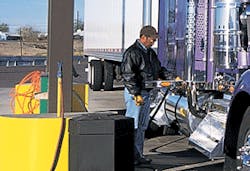KATRINA UPDATE: No telling how long fuel-price spike will last
The hurricane damage to the oil production and refinery infrastructure in the southern states bordering the Gulf of Mexico – a region responsible for a third of all the petroleum imported and processed in the U.S. – is causing a sharp spike in both gasoline and diesel fuel prices across the country.
However, there remains deep division as to whether these price hikes are a short- or long-term phenomenon.
“In our judgment, we view [Hurricane Katrina] as a temporary disruption of the availability and price of fuel that is being addressed by the government and by the private sector,” said President George W. Bush at the White House late yesterday.
President Bush said the Secretary of Energy is approving loans of crude oil from the Strategic Petroleum Reserve and the Environmental Protection Agency is providing a temporary nationwide waiver for fuel requirements so supplies of gasoline can move more easily within the country.
“Another challenge we face is that the downed pipelines are causing the need to transport gasoline to needed markets by ship [but] under current law, shipping between American ports can only take place on American ships -- and there are currently not enough American ships to move the oil and gasoline to where it’s needed,” the President said. That requirement is being temporarily waived so foreign ships can also help distribute oil and gasoline to where it’s needed, he noted.
While the President characterized the price spikes as temporary, others fear the impact will be felt much longer.
“The devastation of Hurricane Katrina makes us painfully aware of our nation’s vulnerability to oil and gasoline supply disruptions and of the pressing need to become as energy efficient as possible to curb demand and reduce high energy prices,” said Brian Castelli, executive vp & COO of the Alliance to Save Energy, a coalition of business, government, and environmental organizations. “Deploying energy efficiency is the quickest, cheapest, cleanest way to extend our nation's energy supplies and bring down prices.”
Pennsylvania Governor Edward Rendell (D) has directed his state’s agencies to put in place energy-saving measures in the wake of Hurricane Katrina. Although no fuel supply shortages have been reported in the Northeast, gas prices continue to increase sharply.
“Energy inflation diminishes spending power, raising the cost of food, airline tickets, delivery services and countless other products,” Gov. Rendell said. “Aside from raising gasoline prices, higher fuel costs also spill over into other markets and impact the price of petroleum-based consumer products, including many pharmaceuticals and cosmetics.”
He is going so far as to temporarily waive regulations restricting truck drivers from driving more than 11 hours per day in the Keystone State. The waiver, effective until Sept. 14, gives commercial operators extra time to move wholesale and retail gasoline and diesel supplies across Pennsylvania. This waiver only applies to intrastate commercial drivers hauling petroleum products.
According to the Minerals Management Service (MMS) division of the Department of Energy, Katrina sliced Gulf of Mexico oil production by over 1.356 million barrels per day. That’s equal to 90.43% of daily Gulf of Mexico oil production, which is 1.5-million barrels per day.
The Energy Information Administration (EIA) added that shortages of gasoline and diesel fuel are inevitable due to the severity of production cuts caused by Katrina.
“With about two million barrels per day of refining capacity shut in or reduced due to Hurricane Katrina, approximately one million barrels per day or 42 million gallons per day of gasoline is not being produced,” EIA reported. “This represents about 10% percent of the nation’s consumption and is a major drop in the normal flow of gasoline through the system.”
The distribution of gasoline, particularly in the Gulf Coast, Midwest, and East Coast regions of the country, is being “significantly affected” by damage caused to Plantation and Colonial product pipelines as well as the Capline crude oil pipeline – all originating from the Gulf of Mexico, noted EIA.
“Localities that were being served from gasoline terminals, which already had low inventory levels perhaps because they were expecting a delivery in the near future, could run out of supply before the next delivery arrives,” EIA said.
To discuss the Katrina disaster and its effect on the trucking industry or share your experiences, please visit FleetOwner's Katrina Blog at blog.fleetowner.com/katrina.
To view the archive of FleetOwner’s ongoing Katrina news coverage, go to www.fleetowner.com/katrina.
About the Author
Sean Kilcarr
Editor in Chief
Sean Kilcarr is a former longtime FleetOwner senior editor who wrote for the publication from 2000 to 2018. He served as editor-in-chief from 2017 to 2018.
